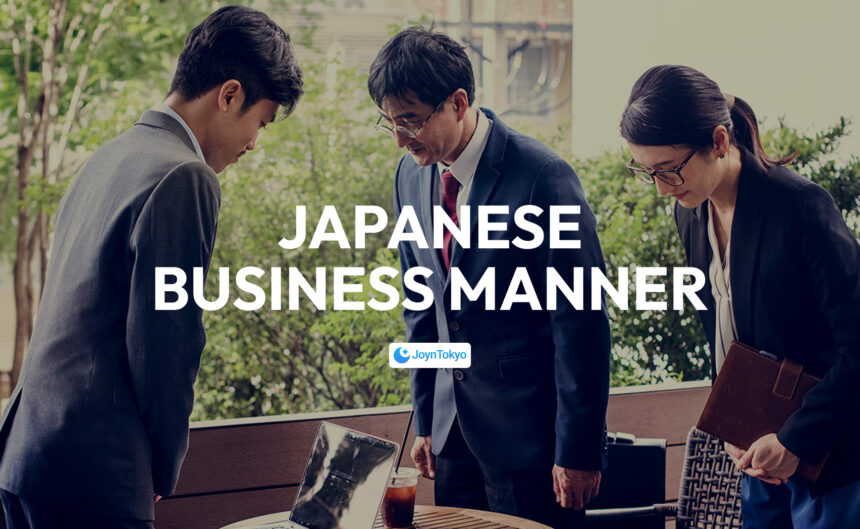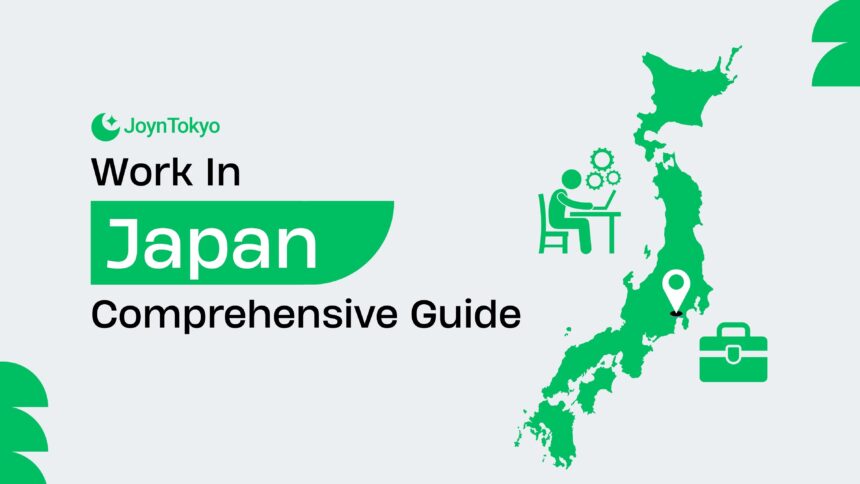Whether you’re preparing for your first business trip to Japan or settling into a long-term role after moving here, understanding Japanese business etiquette can be the difference between a successful partnership and a cultural misstep that could cost you. In Japan, etiquette is more than formality—it’s a language of respect that shapes trust and long-term relationships. This practical guide covers essential aspects of Japanese business manners, from first greetings to professional dinners, so you can navigate the workplace with confidence and cultural fluency.
Making the Right First Impression
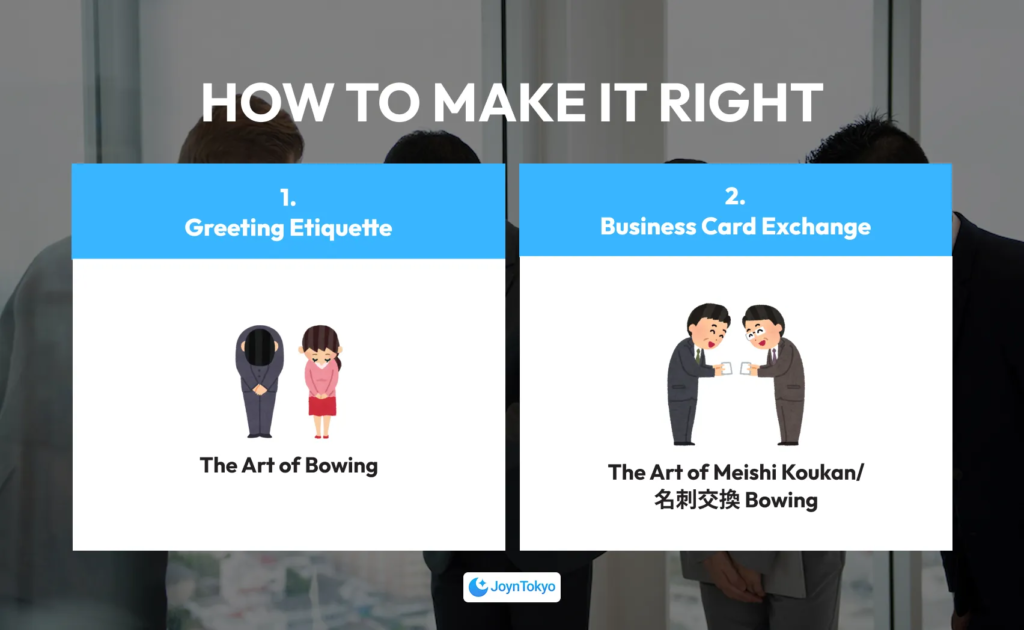
In Japanese business culture, the way you present yourself from the start sets the tone for your entire professional relationship. First impressions are built on subtle but powerful cues like posture, tone, and timing.
1. Greeting Etiquette: The Art of Bowing
Bowing is the traditional form of greeting in Japan and remains more prevalent than handshakes. While handshakes may be used in international settings, they are often accompanied by a bow. The depth of your bow shows the level of respect—deeper for superiors or formal occasions. When in doubt, mirror your counterpart’s gesture.
2. Business Card Exchange (Meishi Koukan/名刺交換)
Business cards, known in Japan as Meishi, are exchanged with both hands and a slight bow. Offer the card with the text facing the recipient, and take a moment to examine the card you receive. Never write on or tuck the card into your back pocket. Carry a proper cardholder to store them respectfully. Under no circumstances you should write on someone els’s business card. In Japan, your business card is considered an extension of yourself, and so to write on it? You might as well take a pen to your opposite’s forehead. Which is to say: don’t.
Navigating the Japanese Workplace
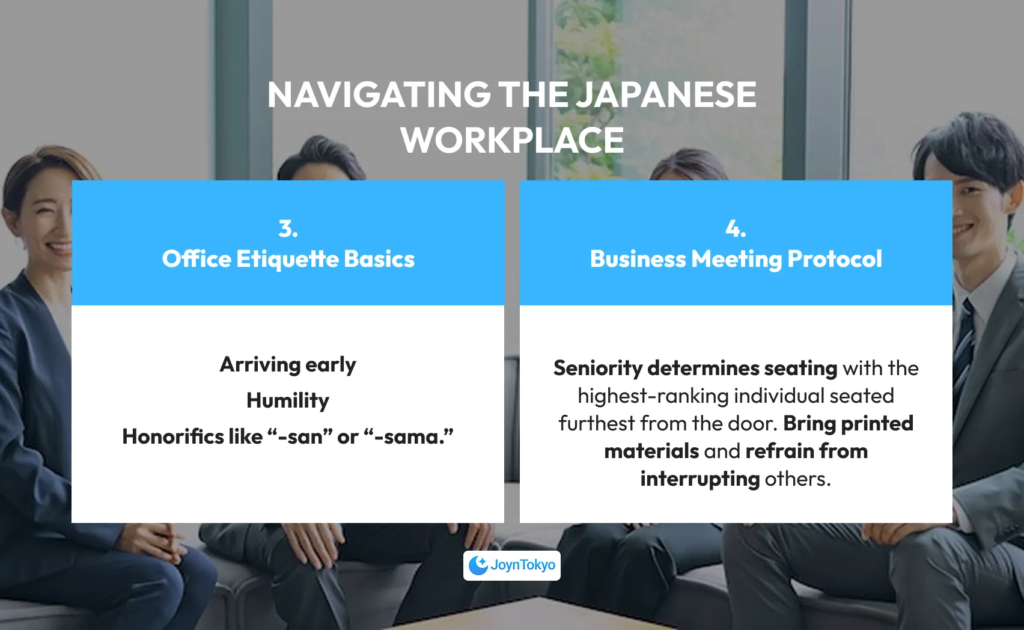
Workplace etiquette in Japan is built on a foundation of group harmony, hierarchy, and punctuality. Being aware of these cultural expectations can help you integrate smoothly and gain the respect of your peers.
3. Office Etiquette Basics
Arriving early is not just appreciated—it’s expected. Japanese workplaces value punctuality as a form of professionalism. Humility is preferred over self-promotion, and maintaining wa (和, also known as “harmony” in English) within the team is essential. Always address colleagues and superiors with appropriate honorifics like “-san” or “-sama.”
4. Business Meeting Protocol
Meetings in Japan are formal and structured. Seniority determines seating, with the highest-ranking individual seated furthest from the door. Bring printed materials for distribution, and refrain from interrupting others. Silence often indicates careful thought, not disengagement.
Business Etiquette Beyond the Office
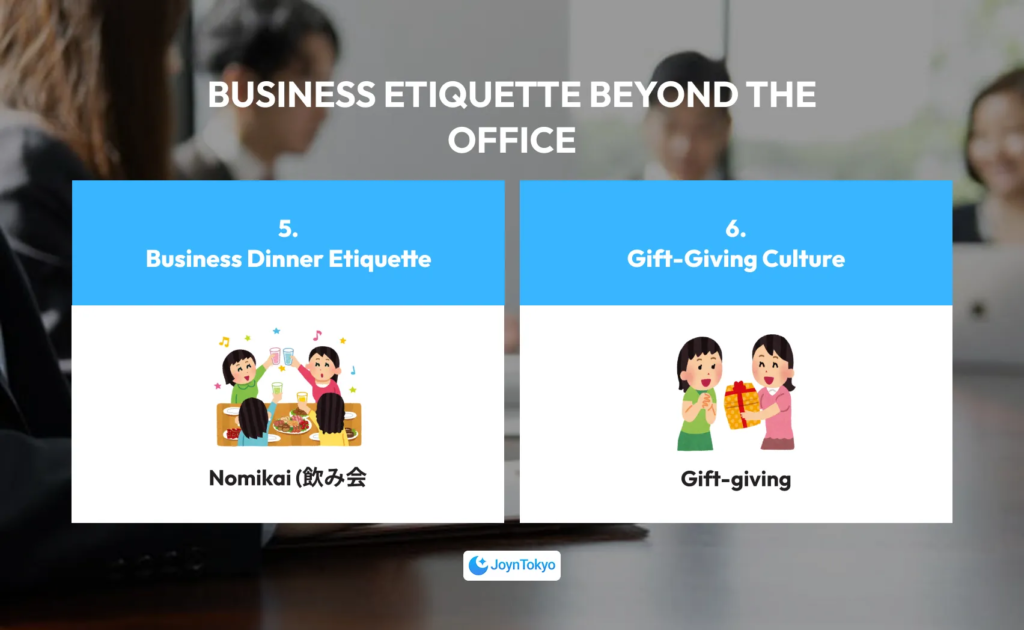
Japanese business culture extends beyond the workplace. Dinners, after-work gatherings, and seasonal events are vital for building rapport and understanding the social dynamics of your team.
5. Business Dinner Etiquette
Nomikai (飲み会, or, drinking gatherings) may seem casual, but they follow unspoken rules. Wait for the most senior person to start drinking, and pour drinks for others—especially superiors—before serving yourself. Indeed, serving yourself can itself be a faux-pas: not because serving yourself is bad in and of itself, but because it seems to make it look as though your drinking mates are not being polite by serving you, after you serve them. Even during relaxed settings, overindulgence is frowned upon. Show appreciation and maintain composure.
6. Gift-Giving Culture
Gift-giving is a symbolic gesture in Japanese business, especially when visiting partners or clients. Choose a modest, thoughtful gift and present it with both hands. Avoid extravagant items, and express humility by saying, “Tsumaranai mono desu ga” (“It’s just a small thing”) or “Okuchi ni auto yoino desu ga” (Hope you like it).
Tips for Thriving in Japanese Business Culture

Even if you’re new to Japan, showing cultural awareness goes a long way. Here are some practical tips to keep in mind:
- Follow your colleagues’ lead: Observe how others behave, especially in new situations.
- Be humble, not aggressive: Assertiveness may be perceived as arrogance.
- Dress conservatively: Business attire is typically formal and understated.
- Avoid confrontation: Aim to resolve issues discreetly and respectfully.
- Express appreciation: A simple “thank you” or bow can reinforce goodwill.
Final Thoughts: Building Respect and Trust
Japanese business manners are not about memorizing rules—they reflect a deeper cultural emphasis on mutual respect, modesty, and harmony. Breaking the letter of a rule but respecting the spirit of the rule is better than, say, bowing in an aggressive way, or giving a cursory handshake. However, by learning these customs, you demonstrate sincerity and adaptability, traits that are highly valued in any workplace.
As you continue your journey in Japan, stay observant, keep learning, and remember that genuine respect will always transcend language or formality. With time and effort, Japanese business etiquette will become second nature, and your professional relationships will flourish.

